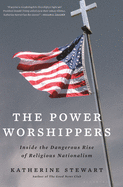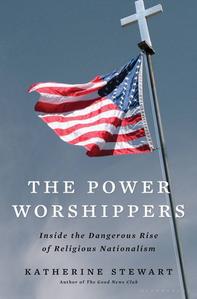
 In December 2019, the venerable evangelical publication Christianity Today caused a furor with an editorial denouncing the "grossly immoral character" of President Donald Trump and calling for his removal from office. The break was noteworthy because of the critical, if not decisive, support evangelical Christians provided Trump in the 2016 election.
In December 2019, the venerable evangelical publication Christianity Today caused a furor with an editorial denouncing the "grossly immoral character" of President Donald Trump and calling for his removal from office. The break was noteworthy because of the critical, if not decisive, support evangelical Christians provided Trump in the 2016 election.
But as journalist Katherine Stewart makes clear in The Power Worshippers: Inside the Dangerous Rise of Religious Nationalism, that enthusiasm had little to do with personal affection for Donald Trump or a favorable judgment of his character. Instead, the project of what she calls "Christian nationalism" is to "replace our foundational democratic principles and institutions with a state grounded on a particular version of Christianity," one that "also happens to serve the interests of its plutocratic funders and allied political leaders." Whether it's appointing judges who share this ideology on issues like abortion or the separation of church and state, or promoting the efforts of Secretary of Education Betsy DeVos to dismantle the American public school system, Trump plays an essential, but far from leading, role.
Stewart has visited a slice of this territory before in her book The Good News Club: The Christian Right's Stealth Assault on America's Children. The Power Worshippers is a more comprehensive, if still compact, journey through the labyrinth of interlocking organizations and personalities that form the ecosystem of a movement that embraces "identity-based authoritarian rule over pluralistic, democratic processes," and seeks to transform the U.S. to serve that vision. Some of the principal actors in this effort, among them Tony Perkins, the media-savvy president of the Family Research Council, may be well-known to even casual observers of the Christian Right's activities. Others, like Bill Dallas, a convicted embezzler who helped found the organization United in Purpose that's engaged in a massive data mining project to boost evangelical voter turnout, almost certainly are not.
Stewart also meticulously details the efforts of writers influenced by the "Christian Reconstructionist" works of R.J. Rushdoony to revise American history to create a false narrative of the country's founding as a Christian nation. And though the subject has been treated in greater depth in books like Jane Mayer's Dark Money and Nancy Maclean's Democracy in Chains, Stewart doesn't omit the crucial role of wealthy economic libertarians, including the Koch brothers and the Mercer family, whose generous funding fuels the engine of this movement.
Striving to end The Power Worshippers on an upbeat note, Stewart argues that Americans opposed to the establishment of a Christian theocracy "just need to reclaim the genuine religious freedom that our founders established and that most of our citizens cherish." But as she leaves no doubt in her disturbing book, it's a battle that will be fought against well-financed, determined and formidable opposition, and one whose outcome is far from certain. --Harvey Freedenberg, freelance reviewer
Shelf Talker: A journalist who has spent a decade covering the activities of the Christian Right painstakingly exposes the movement's effort to undermine the United States' pluralistic democracy.

